| Listing 1 - 10 of 22 | << page >> |
Sort by
|
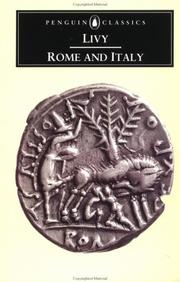
ISBN: 0140443886 9780140443882 Year: 1987 Volume: 6-10 Publisher: Harmondsworth: Penguin books,
Abstract | Keywords | Export | Availability | Bookmark
 Loading...
Loading...Choose an application
- Reference Manager
- EndNote
- RefWorks (Direct export to RefWorks)
Rome --- History --- Histoire --- Rome - History - Republic, 510-265 B.C
Book
ISBN: 9788891308214 8891308218 Year: 2015 Publisher: Roma: L'Erma di Bretschneider,
Abstract | Keywords | Export | Availability | Bookmark
 Loading...
Loading...Choose an application
- Reference Manager
- EndNote
- RefWorks (Direct export to RefWorks)
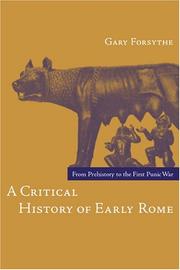
ISBN: 0520226518 9780520226517 Year: 2005 Publisher: Berkeley: University of California press,
Abstract | Keywords | Export | Availability | Bookmark
 Loading...
Loading...Choose an application
- Reference Manager
- EndNote
- RefWorks (Direct export to RefWorks)
During the period from Rome's Stone Age beginnings on the Tiber River to its conquest of the Italian peninsula in 264 B.C., the Romans in large measure developed the social, political, and military structure that would be the foundation of their spectacular imperial success. In this comprehensive and clearly written account, Gary Forsythe draws extensively from historical, archaeological, linguistic, epigraphic, religious, and legal evidence as he traces Rome's early development within a multicultural environment of Latins, Sabines, Etruscans, Greeks, and Phoenicians. His study charts the deve
Rome --- History --- Rome - History - To 510 B.C. --- Rome - History - Republic, 510-265 B.C.
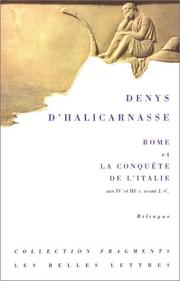
ISBN: 2251742018 9782251742014 Year: 2002 Volume: 2 Publisher: Paris : Belles Lettres,
Abstract | Keywords | Export | Availability | Bookmark
 Loading...
Loading...Choose an application
- Reference Manager
- EndNote
- RefWorks (Direct export to RefWorks)
Rome --- History --- History. --- Antiquities. --- Politics and government. --- Rome - History - Republic, 510-265 B.C.
Book
ISBN: 9782840505808 2840505800 Year: 2008 Volume: *2 Publisher: Paris PUPS
Abstract | Keywords | Export | Availability | Bookmark
 Loading...
Loading...Choose an application
- Reference Manager
- EndNote
- RefWorks (Direct export to RefWorks)
Don de l'auteur
Gauls --- Literature and history --- Historians --- Mythology, Roman. --- Mythology, Indo-European. --- Gaulois --- Littérature et histoire --- Historiens --- Mythologie romaine --- Mythologie indo-européenne --- Rome --- History --- Historiography. --- Histoire --- Historiographie --- Mythology, Indo-European --- Mythology, Roman --- Historiography --- Littérature et histoire --- Mythologie indo-européenne --- Historians - Rome --- Literature and history - Rome --- Gauls - Rome - History --- Rome - History - Republic, 510-265 B.C. - Historiography --- Rome - History - Republic, 510-265 B.C.
Book
ISBN: 9781108478953 9781108748742 9781108781534 1108748740 1108478956 1108781535 1108800963 1108801455 Year: 2021 Publisher: Cambridge: Cambridge university press,
Abstract | Keywords | Export | Availability | Bookmark
 Loading...
Loading...Choose an application
- Reference Manager
- EndNote
- RefWorks (Direct export to RefWorks)
"In this book, Gabriele Cifani reconstructs the early economic history of Rome, from the Iron Age to the early Republic. Bringing a multidisciplinary approach to the topic, he argues that the early Roman economy was more diversified than has been previously acknowledged, going well beyond agriculture and pastoralism. Cifani bases his argument on a systematic review of archaeological evidence for production, trade and consumption. He posits that the existence of a network system, based on cultural interaction, social mobility, and trade, connected Rome and central Tyrrhenian Italy to the Mediterranean Basin even in this early period of Rome's history. Moreover, these trade and cultural links existed in parallel to regional, diversified economies, and institutions. Cifani's book thus offers new insights into the economic basis for the rise of Rome, as well as the social structures of Mediterranean Iron Age societies"--
Rome --- Economic conditions. --- Social conditions. --- 753-265 B.C. --- Rome (Empire). --- History --- Economic conditions --- Social conditions --- Rome - Economic conditions --- Rome - Social conditions --- Rome - History - Kings, 753-510 B.C --- Rome - History - Republic, 510-265 B.C.
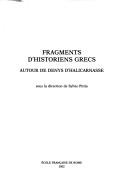
ISBN: 272830663X 9782728306633 Year: 2002 Volume: 298 Publisher: Rome: École française de Rome,
Abstract | Keywords | Export | Availability | Bookmark
 Loading...
Loading...Choose an application
- Reference Manager
- EndNote
- RefWorks (Direct export to RefWorks)
Historians --- Historiens --- Dionysius, --- Rome --- History --- Historiography --- Dionysius of Halicarnassus --- -Historiography. --- Rim --- Roman Empire --- Roman Republic (510-30 B.C.) --- Romi (Empire) --- Byzantine Empire --- Rome (Italy) --- Historiography. --- To 510 B.C. --- Republic, 510-265 B.C. --- Dionysius, - of Halicarnassus - Antiquitates romanae --- Rome - History - To 510 BC - Historiography --- Rome - History - Republic, 510-265 B.C. - Historiography
Book
ISBN: 9782728309610 2728309612 272831361X Year: 2013 Volume: 479 Publisher: Rome: École française de Rome,
Abstract | Keywords | Export | Availability | Bookmark
 Loading...
Loading...Choose an application
- Reference Manager
- EndNote
- RefWorks (Direct export to RefWorks)
Est-il légitime d’employer la notion moderne d’ «honneur» à propos de la République romaine antique ? Les Romains de cette époque obéissaient-ils à un code de conduite strict ? Sur quoi fondaient-ils le prestige social ? Quelles marques de distinction employaient-ils et à quelles fins ? Telles sont quelques-unes des questions auxquelles cet ouvrage tente de répondre. Pour ce faire, l’auteur analyse trois notions romaines, honos, honestum et honestas, qui recouvrent des objets socio-politiques (marques d’honneur, prestige, charges publiques) et des données morales (dignité de la conduite, bien éthique). Cette diversité est appréhendée dans l’ouvrage par une approche plurielle, relevant de la sémantique, de la sociologie et de l’histoire des idées. L’étude préalable du sens de ces termes dans les textes latins débouche ainsi sur l’examen des pratiques d’hommage et d’honorabilité dans la vie des Romains. Confrontant ensuite la pratique à la théorie, l’ouvrage étudie la manière dont ces trois notions ont été employées comme thèmes littéraires, instruments idéologiques et concepts philosophiques chez les auteurs latins de la République.
Honor --- Honesty --- Conduct of life --- Ethics, Ancient --- Honneur --- Honnêteté --- Morale pratique --- Morale ancienne --- History --- Histoire --- Rome --- Moral conditions --- Conditions morales --- Ethics --- Honor in literature --- History. --- Honnêteté --- History / Europe --- Annals --- Auxiliary sciences of history --- Honor - Rome - History --- Ethics - Rome - History --- Rome - History - Republic, 510-265 B.C. --- République romaine --- société romaine --- honneur --- Antiquité romaine
Book
ISBN: 849521539X 9788495215390 Year: 2002 Volume: 6 Publisher: Madrid: Universidad Complutense de Madrid. Servicio de publicaciones,
Abstract | Keywords | Export | Availability | Bookmark
 Loading...
Loading...Choose an application
- Reference Manager
- EndNote
- RefWorks (Direct export to RefWorks)
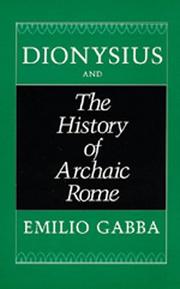
ISBN: 0520073029 9780520073029 Year: 1991 Volume: 56 Publisher: Berkeley (Calif.): University of California,
Abstract | Keywords | Export | Availability | Bookmark
 Loading...
Loading...Choose an application
- Reference Manager
- EndNote
- RefWorks (Direct export to RefWorks)
Dionysius, --- Rome --- History --- Historiography --- Histoire --- Historiographie --- 875 DIONYSIUS HALICARNASSENSIS --- Griekse literatuur--DIONYSIUS HALICARNASSENSIS --- Dionysius of Halicarnassus --- -Historiography. --- 875 DIONYSIUS HALICARNASSENSIS Griekse literatuur--DIONYSIUS HALICARNASSENSIS --- Rim --- Roman Empire --- Roman Republic (510-30 B.C.) --- Romi (Empire) --- Byzantine Empire --- Rome (Italy) --- Historiography. --- Dionysius, - of Halicarnassus - Antiquitates romanae --- Rome - History - To 510 BC - Historiography --- Rome - History - Republic, 510-265 B.C. - Historiography
| Listing 1 - 10 of 22 | << page >> |
Sort by
|

 Search
Search Feedback
Feedback About UniCat
About UniCat  Help
Help News
News